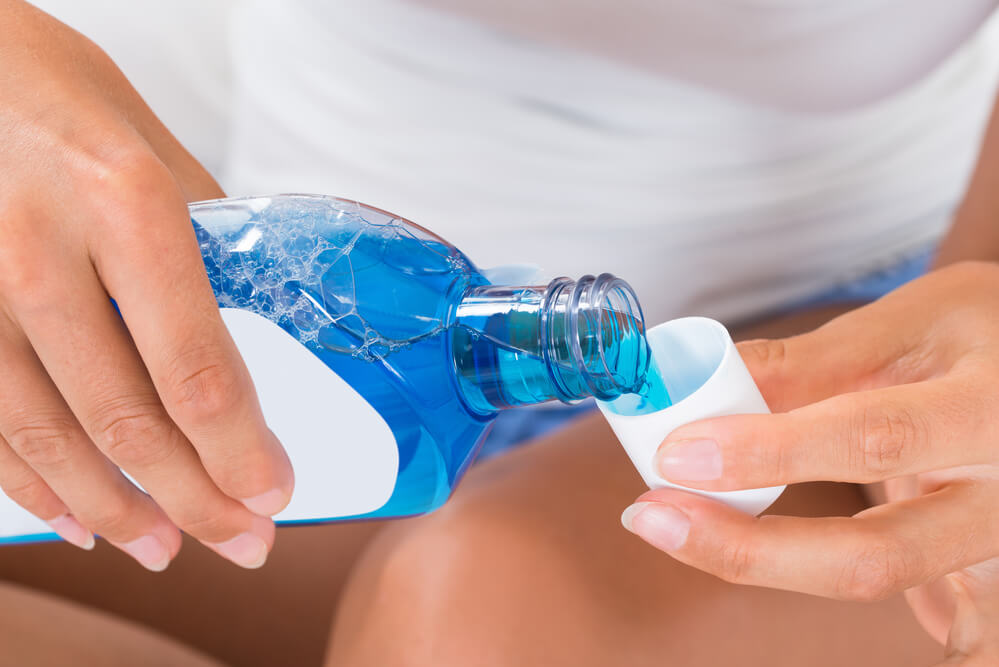
Is Mouthwash Effective for Bad Breath?
Have you ever found yourself in an elevator when somebody you know strikes up a conversation and you’re caught between giving an answer and pretending to be deaf because you’re worried something unpleasant might come out of your mouth, specifically bad breath? Before you take a swig of mouthwash to save yourself from such awkward social interactions, read these recommendations from Gentle Touch Dentistry, a dentist in Palos Hills, to better understand bad breath and mouthwashes.
What Causes Bad Breath?
There are different factors that cause and trigger bad breath; some are easy to fix, while some require much deeper attention. According to the American Dental Association, “Halitosis, or bad breath, most often starts in the mouth.” It is usually a result of poor oral hygiene, such as irregular brushing and flossing. Bad breath can also be caused by dryness in the mouth, as you need your saliva to wash away the food particles processed by your mouth’s own naturally occurring bacteria. Other causes of bad breath include diet, dental caries or tooth decay, plaque buildup, smoking, and other health conditions such as respiratory and digestive illnesses.
Is Mouthwash Effective for Bad Breath?
There is plenty of hoopla about whether mouthwash is actually effective for bad breath, but in fact there is no straight “yes” or “no” answer. According to an article released by the ADA on their oral care website, Mouth Healthy, while mouthwashes can help neutralize or kill bacteria, they are just a temporary solution that works to mask the odor, not to cure the root of it.
There are two kinds of mouthwash, cosmetic and therapeutic. Cosmetic mouthwash is good only for masking bad breath with a fresh, minty smell. It is widely available in drugstores and supermarkets and usually comes in a travel size variety, making it perfect for casual after-meal situations. On the other hand, therapeutic mouthwash contains substances that can treat the cause of bad breath such as plaque and bacteria. Some therapeutic mouthwash brands are even proven to effectively whiten teeth. If the cause of your bad breath is more than just what you had for lunch, it is recommended that you go for the therapeutic mouthwash over cosmetic. It is available over-the-counter and by prescription, depending on what formulation suits your oral care needs.
How to Choose the Right Mouthwash for You
As explained above, not all mouthwashes are created equal. Not only do they come in cosmetic or therapeutic variants, some mouthwashes can actually do more damage than good if you don’t know how to choose the right mouthwash for you. Substances found in therapeutic mouthwashes address some causes of bad breath, with some washes containing more substances than others. When choosing a therapeutic mouthwash, watch out for these substances:
- Alcohol: Especially in large amounts, alcohol can have negative effects on the oral environment by killing even the good, naturally occurring bacteria that help break down the food particles in your mouth. Other way it can do damage is by irritating existing mouth sores, which can cause infection and an even worse-smelling odor. When choosing a mouthwash, it is recommended that you pick a non-alcohol variant.
- Chlorine dioxide: In a study conducted by dental experts from Japan and Australia, chlorine dioxide was found to have reduced bad breath during the 7-day period of the experiment. Chlorine dioxide is effective in killing bacteria that produce odor-causing volatile sulfur compounds, believed to be the number one cause of oral malodor.
- Chlorhexidine, cetylpyridiniumand zinc lactate: Just like chlorine oxide, these substances are antimicrobials that reduce bad breath by killing bad bacteria. However, it’s been shown that when combined, these three substances can cause tooth staining over time.
- Fluoride ions: Fluoride helps prevent tooth decay but, when consumed in large amounts, can result in dental fluorosis, manifested by tiny white streaks on the tooth enamel.
- Carbamide peroxide or hydrogenperoxide: These substances have been proven to aid in teeth whitening when used regularly.
When in doubt, the best way you can choose the right mouthwash for you is to look for the American Dental Association’s seal of approval. Oral care products are submitted to the ADA for testing and approval before they are released in the market.
Never Rely on Mouthwash Alone
Mouthwash may be effective in fighting bad breath, but nothing beats good oral hygiene. Remember to brush, floss and rinse at least three times a day and see your dentist for regular teeth cleaning. In cases of chronic halitosis, it is prescribed to see a dentist to get to the root of it. You may also consider a shift in your lifestyle such as a change in diet, quitting smoking and eating food that stimulates the production of saliva, such as apples and carrots.

